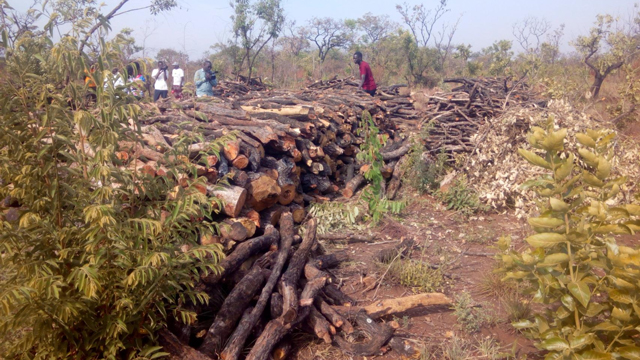
Agago, Uganda | THE INDEPENDENT | Hundreds of different trees species covering an estimated 100 acres of land in Agago district have been destroyed by commercial charcoal dealers within the past two years, an environmental justice pressure group in Acholi sub-region has revealed.
The pressure group named Our Trees, We Need Answers, visited Adilang Sub County in Agago district on March 15th 2021 and witnessed an indescribable level of environmental destruction by the commercial charcoal dealers.
Willy Choowoo, a member of the pressure group, said they made a walk of about 5 miles in only one village (Bul Ayita) and discovered that all kinds of trees on between 10-20 acres of land were cut down for charcoal burning within a space of six months.
According to Choowoo, they met only 40 charcoal burners, but locals estimated that there are between 200-500 charcoal burners in the area.
“In that one Village we moved in, the level of destruction I saw can be between 10-20 acres of land destroyed within the last six months. And they have moved away from other trees and are now cutting the endangered shea nut trees. And if you ask them why, they say they are not aware that shea but is a protected species. And in the short distance we covered, we met about 40 tree cutters. They cut all the trees, orderly, like eating termites.”
Choowoo says the charcoal dealers started entering the district in two years ago but their number is said to have increased during the general campaigns and elections. He says although the dealers are now concentrating in Pader, Kitgum, Agago, and Lamwo districts the level of damage is most pronounced in Agago district, where an estimated 100 acres of trees have been cut.
“The number of these charcoal burners increased when campaigns for the general elections started because, during that time, leaders fear to question their electorate for fear of losing votes,” he said.
According to Choowoo, the charcoal dealers are riding on the ignorance of the locals and have convinced them into selling trees on each acre of land at Shillings 300,000.
Author Owor, a director at the Center for African Research in Gulu and coordinator of Our Trees, We Need Answers, reveals that the commercial charcoal dealers are from as far as Nakasongola, Luwero, Iganga, Mukono, Mbale and Soroti districts among others.
A team of environmental activists attended a security meeting stemming from concerns from the locals held on March 14th, 2021, and found that the charcoal burners have no permits, no letters from their districts or that of the area where they have settled yet they have erected settlements and have a trading center of their own.
Owor reveals that the charcoal dealers have also opened up road a network that connect to districts like Abim and Otuke allowing them to evade police and transport charcoal at night in box-bodied trucks.
He notes that the charcoal dealers are also involved in child labor and using “fake marriages” to woo the locals into giving them access to the trees.
George Avola, a member of the pressure group, said it is disappointing that all leaders in the area are feigning ignorance of the charcoal dealers yet the dealers claim they have settled there for two years.
Avola reveals that the charcoal dealers tell the locals that they are only buying trees, yet the agreement shows that they have bought the land. He blamed the cultural leaders for failing to take lead to protect the Shea nut tree, which has a high cultural value in Acholi.
In 2016, cultural leaders in Acholi enacted a by-law prohibiting the cutting of shea nut trees. According to the by-law, one found cutting the Shea nut tree is liable to a fine of between Shillings 200,000-400,000. The cultural leaders also instituted vigilante groups to enforce the arrest and fine those found cutting shea nut trees.
However, Bosco Labeja, a member of the vigilante group in Pader district, told Uganda Radio Network that not all the enforcers of the by-law are honest. Labeja says since shea nut trees cover a vast area of land that are mostly uninhabited, some of the enforcers use that as an opportunity to take bribes because no one would be seeing them.
Attempts to get a comment from the Agago RDC didn’t yield results since he was going into a meeting. In 2018, the government through the Ministry of Water and Environment, in line with Section 29 (1 & 3) of the National Forestry and Tree Panting Act 2003, suspended the cutting, transportation and sale of products of Shea nut trees, following its rapid destruction, however, trade-in the protected tree species continues.
********
URN
 The Independent Uganda: You get the Truth we Pay the Price
The Independent Uganda: You get the Truth we Pay the Price


